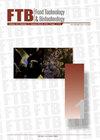Optimisation of Almond-Based Dairy-Free Milk Alternative Formulation Fortified with Myrtle, Bay Leaf and Fennel Extracts
IF 2.5
4区 农林科学
Q3 BIOTECHNOLOGY & APPLIED MICROBIOLOGY
引用次数: 0
Abstract
Research background. Herbs and spices used in traditional medicine are nowadays increasingly used in combinations to create functional food formulations aimed at treating specific symptoms and disorders. Among herbs originating from the Mediterranean region, extracts of myrtle (Myrtus communis L.), bay leaf (Laurel nobilis L.) and fennel (Foeniculum vulgare Mill.) are traditionally used for gastrointestinal disorders. When considering how to incorporate these extracts into products, dairy-free milk alternatives provide an excellent base with almond-based drinks being among the most popular within this group. Experimental approach. The aim of this study is therefore to optimise the formulation of an almond drink fortified with a 25 % (on dry mass basis) aqueous herbal extract containing myrtle, bay leaf (25 % each) and fennel seed (50 %) extracts. A central composite design with 20 formulations varied the content of φ(aqueous herbal extract)=2–6 %, lecithin as emulsifier 0.15–0.45 and xylitol as sweetener 2–5 % (m/V), while antioxidant activity, total phenolic content and sensory properties were determined as dependent variables. Results and conclusions. The antioxidant activity and total phenolic content of the prepared almond drink formulations increased with the amount of added concentrated aqueous herbal extracts, as did the colour, herbal odour and flavour, bitterness and aftertaste. The addition of lecithin resulted in a darker colour and the sweetness was increased by the xylitol content. All formulations had good overall attractiveness, which increased with higher xylitol content. Novelty and scientific contribution. The current work offers new insights into the optimisation of fortified dairy-free alternatives. The addition of myrtle, bay leaf and fennel seed extracts to almond drink-based formulations resulted in a 12-fold increase in antioxidant activity. Xylitol masks the potential bitterness of the phenolic compounds so that higher amounts of extracts can be added.以桃金娘、月桂叶和茴香提取物强化的杏仁为基础的无乳替代配方的优化
研究背景。传统医学中使用的草药和香料如今越来越多地用于组合,以创造旨在治疗特定症状和疾病的功能性食品配方。在源自地中海地区的草本植物中,桃金娘(Myrtus communis L.)、月桂叶(Laurel nobilis L.)和茴香(Foeniculum vulgare Mill.)的提取物传统上用于治疗胃肠道疾病。当考虑如何将这些提取物纳入产品时,无乳牛奶替代品提供了一个很好的基础,杏仁饮料是这一群体中最受欢迎的。实验方法。因此,本研究的目的是优化杏仁饮料的配方,其中含有25%(干质量基础)的水草药提取物,其中含有桃金桃,月桂叶(各25%)和茴香籽(50%)提取物。以中草药水提物φ =2 - 6%,卵磷脂为乳化剂0.15-0.45,木糖醇为增甜剂2 - 5% (m/V),以抗氧化活性、总酚含量和感官性能为依赖变量,设计了20个配方的中心复合设计。结果和结论。所制备的杏仁饮料配方的抗氧化活性和总酚含量随着浓缩草药水提取物的添加量的增加而增加,颜色、草药气味和风味、苦味和回味也有所增加。卵磷脂的加入使颜色变深,木糖醇的含量增加了甜度。各配方具有良好的整体吸引力,木糖醇含量越高,整体吸引力越强。创新和科学贡献。目前的工作为强化无乳制品替代品的优化提供了新的见解。在杏仁饮料配方中加入桃金娘、月桂叶和茴香籽提取物,其抗氧化活性增加了12倍。木糖醇掩盖了酚类化合物潜在的苦味,因此可以添加更多的提取物。
本文章由计算机程序翻译,如有差异,请以英文原文为准。
求助全文
约1分钟内获得全文
求助全文
来源期刊

Food Technology and Biotechnology
工程技术-生物工程与应用微生物
CiteScore
3.70
自引率
0.00%
发文量
33
审稿时长
12 months
期刊介绍:
Food Technology and Biotechnology (FTB) is a diamond open access, peer-reviewed international quarterly scientific journal that publishes papers covering a wide range of topics, including molecular biology, genetic engineering, biochemistry, microbiology, biochemical engineering and biotechnological processing, food science, analysis of food ingredients and final products, food processing and technology, oenology and waste treatment.
The Journal is published by the University of Zagreb, Faculty of Food Technology and Biotechnology, Croatia. It is an official journal of Croatian Society of Biotechnology and Slovenian Microbiological Society, financed by the Croatian Ministry of Science and Education, and supported by the Croatian Academy of Sciences and Arts.
 求助内容:
求助内容: 应助结果提醒方式:
应助结果提醒方式:


